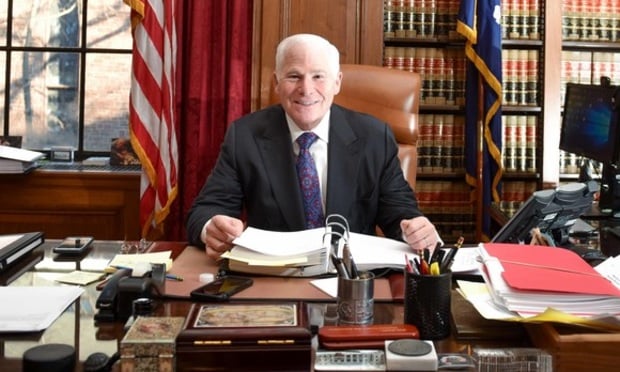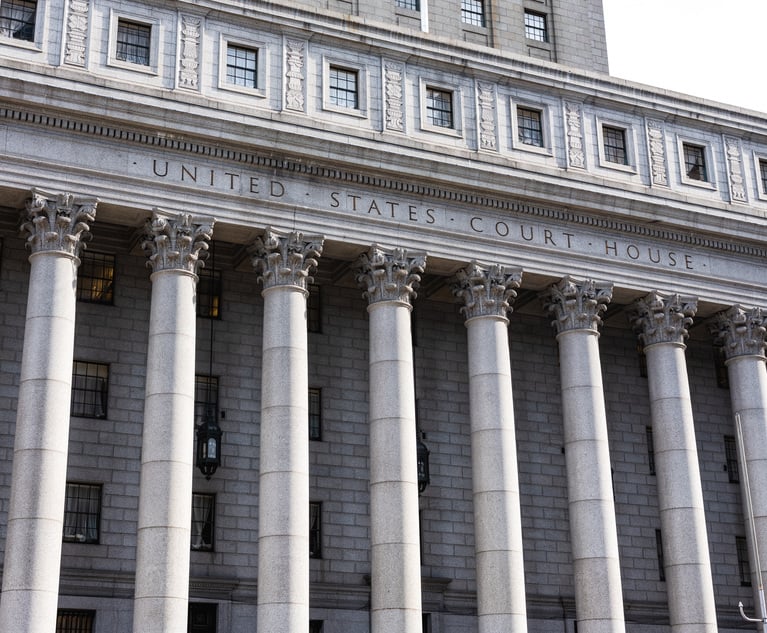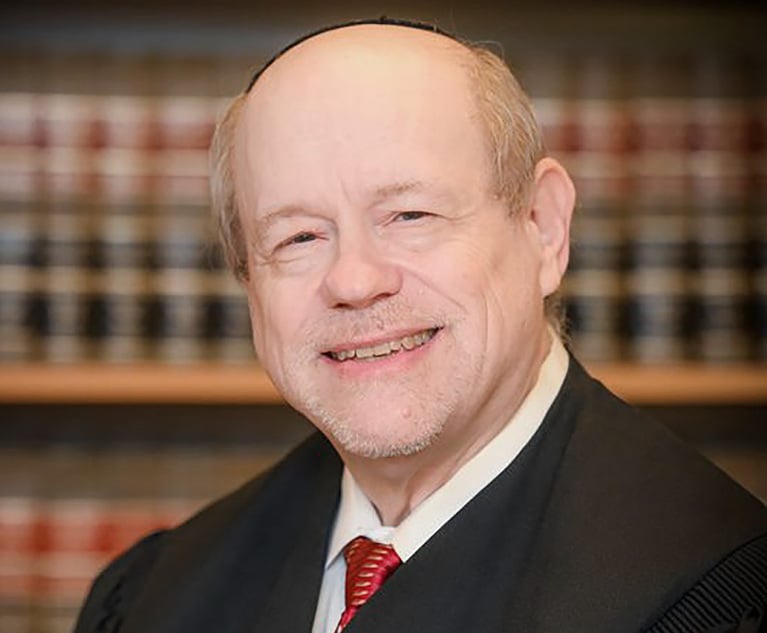Split Personal Injury Trials Not a Hard Rule, Court Says in Upending Years-Old 'Presumption'
The ruling "means that plaintiffs lawyers should be more aggressive in asking for a unified trial," one attorney said.
September 19, 2019 at 12:51 PM
10 minute read
 Justice Scheinkman. Photo: David Handschuh/ALM
Justice Scheinkman. Photo: David Handschuh/ALM
In a written opinion that could have major implications for personal injury trials throughout the Second Department for years to come, a unanimous appellate panel has made clear to trial judges and personal injury lawyers that they have been operating for many years with too strong of a presumption that trials must be bifurcated, with one for liability and one for damages.
"There is little doubt but that the Bench and the Bar in the Second Department perceive that our precedent is, in contrast to the approach of the other departments, inflexibly, or nearly inflexibly, in favor of bifurcation," the Appellate Division, Second Department wrote in a recent opinion in Manuel Castro v. Malia Realty and Target Contracting. "We stress today that the trial courts in the Second Department have the discretion to determine whether a personal injury trial should be unified or bifurcated in accordance with the standard set forth in the statewide rule."
Attorneys say that the effect of that language and other language in the opinion may be that—as already appears to happen much more frequently in other Appellate Division departments—more unified personal injury trials will take place in the Second Department.
Lawyers interviewed Wednesday said that, for reasons not exactly understood by them, it has long been accepted throughout New York's huge personal injury bar that in the Second Department—covering Brooklyn, Queens, Staten Island and Long Island—that personal injury trials are bifurcated. By contrast, they said, in the First Department, for example, it's expected that liability and damages will be often or generally tried together.
According to at least one longtime plaintiffs-side personal injury lawyer and one veteran defense-side lawyer, if a shift to more unified trials in the Second Department happens, it will generally favor plaintiffs, who will get to place information about their injuries and suffering before more juries making crucial liability decisions. And an increase in unified trials—or even an increased expectation that a judge may order one—could lead to more plaintiffs' verdicts, one of the lawyers pointed out, along with more or earlier settlements by defendants who wouldn't be in position to wait and see what happens with the liability phase before having to deal fully with damages and the client's out-of-pocket risk.
Panel Justices Alan Scheinkman, Hector LaSalle, Betsy Barros and Angela Iannacci also wrote in Castro that "we stress that bifurcation of the trial of personal injury cases is not absolutely required in the Second Department, and trial courts should use their discretion in determining, in accordance with the statewide rule, whether bifurcation will assist in clarifying or simplifying the issues and in achieving a fair and more expeditious resolution of the action."
In another part of the opinion, the justices further point out that "neither the statewide rule [22 NYCRR 202.42[a]] nor the governing precedent absolutely requires that the trial of a personal injury action be bifurcated. Although bifurcation is encouraged in appropriate settings, bifurcation is not an absolute given and it is the responsibility of the trial judge to exercise discretion in determining whether bifurcation is appropriate in light of all relevant facts and circumstances presented by the individual cases."
The panel reversed Queens Supreme Court Justice Robert McDonald's 2015 decision to deny plaintiff Manuel Castro's pretrial motion for a unified liability and damages trial. And, therefore, the panel set aside the verdict in Castro's case while ordering a new, unified trial.
"In the case now before us, a unified trial should have been conducted but was not, due to the Supreme Court's perception that Second Department precedent is strictly and inflexibly in favor of bifurcation," the justices wrote in an introduction section of the opinion, before moving to the case's facts and an appellate analysis.
According to the panel, Castro claimed that he'd suffered brain, head, shoulder and spine injuries after falling from faulty scaffolding while working at a construction site in 2010. In 2011, he and related plaintiffs sued Malia Realty, the site's owner, alleging negligence as well as Labor Law violations. Subsequently, Malia brought a third-party action against Castro's employer, Target Contracting, the panel said.
In challenging the alleged Labor Law violation, Malia and Target claimed that Castro didn't fall from a scaffold and suffer a head injury, but instead injured his neck and back lifting wooden planks, the panel wrote.
Castro, in moving for a unified trial—which Malia didn't oppose but Target did—argued that evidence regarding Castro's head and brain injuries was necessary at a trial in order to refute the Malia and Target contentions about him sustaining neck and back injuries from lifting planks, the panel wrote.
In addition, noted the panel, Target's counsel planned to present, during the liability trial phase, testimony from treating physicians who took a medical history from Castro of him injuring himself by lifting a plank or moving a scaffold.
McDonald ruled that a bifurcated trial was "required under the Second Department rules," and stated that "in the interest of justice" he would allow the plaintiffs to cross-examine the treating physicians regarding whether Castro's injuries were consistent with a fall, but that the plaintiffs wouldn't be able to go "into too much detail," according to the appellate decision.
In reversing McDonald's ruling in their Sept. 11 opinion, the justices wrote, in part, near the end of an 8-page opinion that "the [trial] court's determination was predicated upon its perception that a bifurcated trial was strictly required by the Second Department's 'rules.'"
They also wrote, "Due to the trial court's rulings, the medical testimony at the liability phase of the trial was essentially limited to whether the medical records demonstrated a history consistent with a fall from a scaffold or from lifting wooden planks. Testimony concerning causation and the nature and extent of Castro's injuries was not permitted. Because the issues of liability and Castro's injuries were so intertwined, the court's insistence upon bifurcation and its ensuing limitations on the scope of the medical evidence that could be elicited by the plaintiffs deprived them of a fair trial."
In the appeal before the Second Department in the Castro case, Castro and related plaintiffs were represented by Joshua Annenberg of Annenberg Law. Joseph Pareres of Silverson, Pareres & Lombardi helped represent Malia Realty, and John Hoefling at Kelly, Rode and Kelly in Mineola helped represent Target Contracting.
Pareres said in an email: "We are extremely disappointed at the appellate court's decision since there was overwhelming evidence in the form of documents and witness testimony introduced at trial to justify the jury verdict in favor of the defendants. The issue of bifurcation had absolutely no bearing of the ability of the jury to render its verdict."
The other attorneys couldn't be reached for comment Wednesday.
Paul Edelstein, a veteran personal injury trial lawyer who mostly represents plaintiffs, said in an interview Wednesday that he believes the Second Department's Castro opinion amounts to "a great decision for plaintiffs lawyers."
"I think what this decision is standing for is that presumption [for a bifurcated trial] may be a little different than that what people believed prior," said Edelstein of Edelstein, Faegenburg & Brown. "This decision is really saying there is discretion, or more discretion than what was previously thought."
"And that means that plaintiffs lawyers should be more aggressive in asking for a unified trial," according to Edelstein, who said he has tried dozens of cases in the Second Department.
He also explained why he views having a single trial as better for many plaintiffs: "The advantage is that you get to put your client's injuries in front of a jury during the liability phase, which often legitimizes the entire case."
"Imagine," he said, "you have regular run-of-the-mill car accident case, and the jury never heard your client had to have three surgeries, and it may be perceived that there really wasn't a serious injury in the case."
"If [jurors] know, it may cause them to examine the liability aspect of the case with much more attention," he said, adding that the Castro decision "may very well foster more settlements … because defendants won't have the ability as often to get a free shot on liability, and see what happens" before having to face damages.
Daniel Stewart, a personal injury defense and insurance defense lawyer based in Manhattan who regularly tries Second Department cases, said Wednesday of the panel's Castro decision, "I don't know that it will necessarily open the floodgates [for more unified trials], because the Second Department is still saying that if you want a unified trial, you've got to establish that damages are inextricably intertwined with liability"—a high standard, he said.
Still, "I would say generally," more unified trials, if that happens, is better for plaintiffs, in part because of "the sympathy factor—juries, when they hear about this kind of stuff"—injuries and suffering—"it is difficult for them to keep sympathies out if it."
Stewart, a partner at Fleischner Potash, also said that "for my 23 years now [as a litigator], it's just been understood that in Brooklyn and Queens and Long Island, you get a bifurcated trial, and in Manhattan and the Bronx [in the First Department] you get a unified trial."
The Castro panel justices outlined why the strong presumption favoring bifurcation apparently existed.
"In 1979, this Court adopted a rule, binding on the trial courts in this Department, requiring that a bifurcated trial be directed unless there were 'exceptional circumstances' and 'good cause' for holding a single, unified trial on the issues of liability and damages (22 NYCRR former 699.14[a])," they wrote.
Then in 1986, according to the justices, "this rule was replaced by a uniform rule [22 NYCRR 202.42[a]] applicable to trial courts throughout the state providing that '[j]udges are encouraged to order a bifurcated trial [o]n the issues of liability and damages in any action for personal injury where it appears that bifurcation may assist in a clarification or simplification of issues and a fair and more expeditious resolution of the action.'"
The four-justice panel then explained that "although the statewide rule does not, on its face, contain as strong a presumption of bifurcation as did the former Second Department rule, this Court has continued to apply case law developed under the old rule to the effect that a unified trial should be held only where the nature of the injuries has an important bearing on the issue of liability."
Moreover, pointed out the justices, "cases from the other judicial departments indicate that a unified trial may be appropriate in other circumstances." Moreover, they noted, while providing some case examples, "it appears that the First and Third Departments have relaxed this [state 22 NYCRR 202.42[a]] standard in more recent cases."
This content has been archived. It is available through our partners, LexisNexis® and Bloomberg Law.
To view this content, please continue to their sites.
Not a Lexis Subscriber?
Subscribe Now
Not a Bloomberg Law Subscriber?
Subscribe Now
NOT FOR REPRINT
© 2025 ALM Global, LLC, All Rights Reserved. Request academic re-use from www.copyright.com. All other uses, submit a request to [email protected]. For more information visit Asset & Logo Licensing.
You Might Like
View All
Decision of the Day: Qui Tam Relators Do Not Plausibly Claim Firm Avoided Tax Obligations Through Visa Applications, Circuit Finds

'Serious Legal Errors'?: Rival League May Appeal Following Dismissal of Soccer Antitrust Case
6 minute read
Decision of the Day: Judge Sanctions Attorney for 'Frivolously' Claiming All Nine Personal Injury Categories in Motor Vehicle Case

Trending Stories
- 1ACC CLO Survey Waves Warning Flags for Boards
- 2States Accuse Trump of Thwarting Court's Funding Restoration Order
- 3Microsoft Becomes Latest Tech Company to Face Claims of Stealing Marketing Commissions From Influencers
- 4Coral Gables Attorney Busted for Stalking Lawyer
- 5Trump's DOJ Delays Releasing Jan. 6 FBI Agents List Under Consent Order
Who Got The Work
J. Brugh Lower of Gibbons has entered an appearance for industrial equipment supplier Devco Corporation in a pending trademark infringement lawsuit. The suit, accusing the defendant of selling knock-off Graco products, was filed Dec. 18 in New Jersey District Court by Rivkin Radler on behalf of Graco Inc. and Graco Minnesota. The case, assigned to U.S. District Judge Zahid N. Quraishi, is 3:24-cv-11294, Graco Inc. et al v. Devco Corporation.
Who Got The Work
Rebecca Maller-Stein and Kent A. Yalowitz of Arnold & Porter Kaye Scholer have entered their appearances for Hanaco Venture Capital and its executives, Lior Prosor and David Frankel, in a pending securities lawsuit. The action, filed on Dec. 24 in New York Southern District Court by Zell, Aron & Co. on behalf of Goldeneye Advisors, accuses the defendants of negligently and fraudulently managing the plaintiff's $1 million investment. The case, assigned to U.S. District Judge Vernon S. Broderick, is 1:24-cv-09918, Goldeneye Advisors, LLC v. Hanaco Venture Capital, Ltd. et al.
Who Got The Work
Attorneys from A&O Shearman has stepped in as defense counsel for Toronto-Dominion Bank and other defendants in a pending securities class action. The suit, filed Dec. 11 in New York Southern District Court by Bleichmar Fonti & Auld, accuses the defendants of concealing the bank's 'pervasive' deficiencies in regards to its compliance with the Bank Secrecy Act and the quality of its anti-money laundering controls. The case, assigned to U.S. District Judge Arun Subramanian, is 1:24-cv-09445, Gonzalez v. The Toronto-Dominion Bank et al.
Who Got The Work
Crown Castle International, a Pennsylvania company providing shared communications infrastructure, has turned to Luke D. Wolf of Gordon Rees Scully Mansukhani to fend off a pending breach-of-contract lawsuit. The court action, filed Nov. 25 in Michigan Eastern District Court by Hooper Hathaway PC on behalf of The Town Residences LLC, accuses Crown Castle of failing to transfer approximately $30,000 in utility payments from T-Mobile in breach of a roof-top lease and assignment agreement. The case, assigned to U.S. District Judge Susan K. Declercq, is 2:24-cv-13131, The Town Residences LLC v. T-Mobile US, Inc. et al.
Who Got The Work
Wilfred P. Coronato and Daniel M. Schwartz of McCarter & English have stepped in as defense counsel to Electrolux Home Products Inc. in a pending product liability lawsuit. The court action, filed Nov. 26 in New York Eastern District Court by Poulos Lopiccolo PC and Nagel Rice LLP on behalf of David Stern, alleges that the defendant's refrigerators’ drawers and shelving repeatedly break and fall apart within months after purchase. The case, assigned to U.S. District Judge Joan M. Azrack, is 2:24-cv-08204, Stern v. Electrolux Home Products, Inc.
Featured Firms
Law Offices of Gary Martin Hays & Associates, P.C.
(470) 294-1674
Law Offices of Mark E. Salomone
(857) 444-6468
Smith & Hassler
(713) 739-1250






